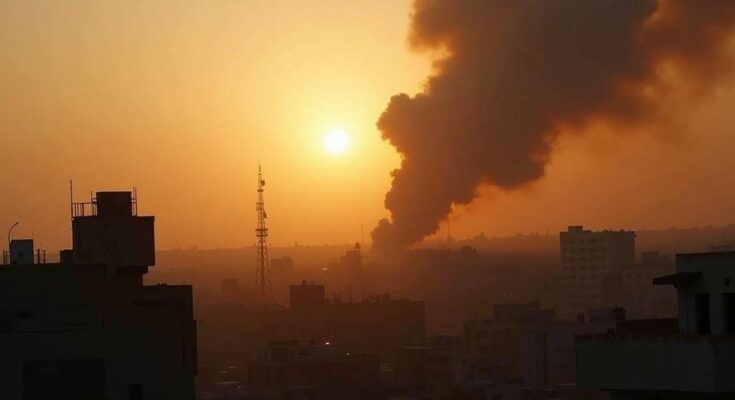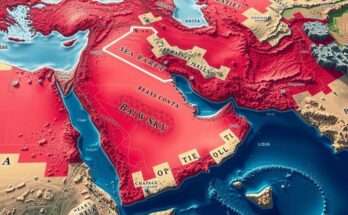Recent hostilities between Iran and Israel have erupted, with Iran launching over 180 ballistic missiles in an attack that Israeli Prime Minister Benjamin Netanyahu condemned. The United States has reaffirmed its strong support for Israel, while Iranian officials claim their strikes were defensive responses. The situation has led to significant casualties in Lebanon and prompted international reactions, highlighting the urgent need for resolution in the region.
In a significant escalation of hostilities, Iranian forces launched over 180 ballistic missiles at Israel, prompting a robust response from Israeli leadership. Prime Minister Benjamin Netanyahu pledged that Iran would face severe consequences for this act of aggression, emphasizing the commitment of both Israel and the United States to retaliate. Most of the missiles were intercepted as they were launched against military installations within the country. US President Joe Biden affirmed America’s unwavering support for Israel, stating, “The attack appears to have been defeated and ineffective, and this is a testament to Israeli military capability and the US military.” Biden underscored that the United States remains “fully supportive of Israel.” In their defense, Iranian officials claimed that the Fattah missiles successfully struck 90% of their intended targets. Following the attack, Iranian Foreign Minister Abbas Araqchi indicated that any further military action would be contingent upon Israel’s provocations. Israeli military actions have extended to Lebanon, resulting in heavy casualties, with the Lebanese health ministry reporting that airstrikes left fifty-five people dead and over 150 injured. In the wake of these escalating tensions, the UN Security Council convenes for an emergency session to address the rapid deterioration of the situation in the region. Former Israeli Prime Minister Naftali Bennett remarked that Israel currently holds a historical opportunity to significantly alter the landscape of the Middle East. He urged that the conflict be utilized to dismantle Iran’s nuclear capabilities, underscoring a call to “fatally cripple this terrorist regime.” Hamas has publicly praised Iran’s military response, describing the missile strikes as a just retaliation for recent Israeli actions resulting in substantial loss of life. French President Emmanuel Macron condemned the Iranian assault and reaffirmed France’s military alliance with Israel while advocating for Lebanon’s territorial integrity in alignment with international frameworks of conflict resolution. As hostilities persist, Israel executed additional raids in southern Beirut, further escalating the already dire humanitarian crisis in Lebanon. Leaders from both the US and Israel continue to discuss collective measures to impose consequences on Iran, reinforcing their commitment to national security amidst ongoing regional volatility.
The current conflict between Iran and Israel stems from longstanding tensions involving military confrontations, territorial disputes, and regional power dynamics. Iran’s missile attacks are framed by Tehran as defensive measures against Israeli operations targeting Iranian assets and military leaders. Historically, both nations have engaged in proxy wars across the Middle East, with Lebanon being a significant battleground due to its complex political affiliations and alliances. The violence has prompted international responses from major powers, concerned about the potential for a wider conflict in a geopolitically sensitive area. The recent escalation, marked by missile exchanges and military operations in Lebanon, has drawn global attention, leading to urgent discussions within the United Nations and influential Western capitals. Israel’s ongoing military actions against Hezbollah in Lebanon, coupled with its strategic partnership with the United States, suggest a concerted effort to deter Iranian influence and ensure national security. Meanwhile, the humanitarian ramifications of intensified military operations in Lebanon have triggered alarm about civilian casualties and regional stability.
In summary, the current military conflict between Iran and Israel has escalated sharply following missile exchanges, with casualties reported in Lebanon and serious geopolitical ramifications anticipated. The Israeli leadership has pledged retaliation, and discussions among US and Israeli officials indicate a united front against Iranian aggression. The ongoing situation highlights the critical need for diplomatic efforts to de-escalate tensions and protect civilians in the affected regions while addressing the broader implications for Middle Eastern stability.
Original Source: www.hindustantimes.com




